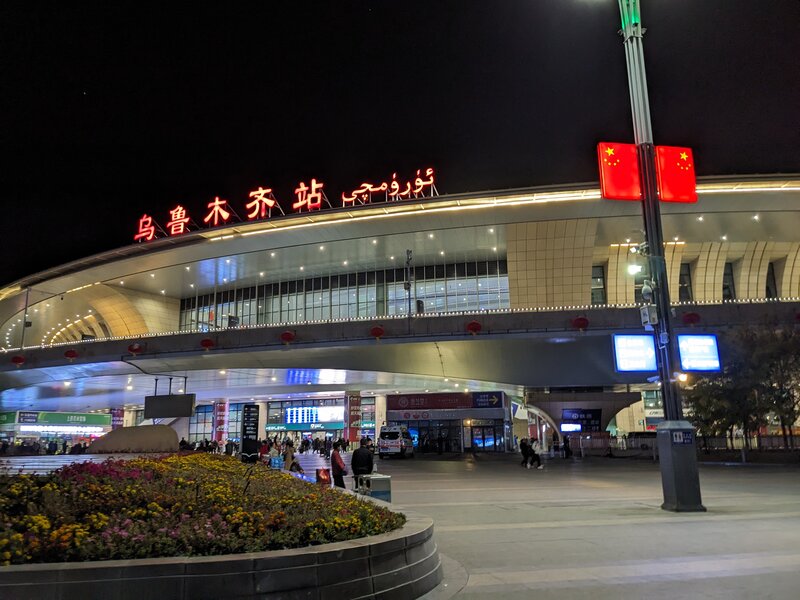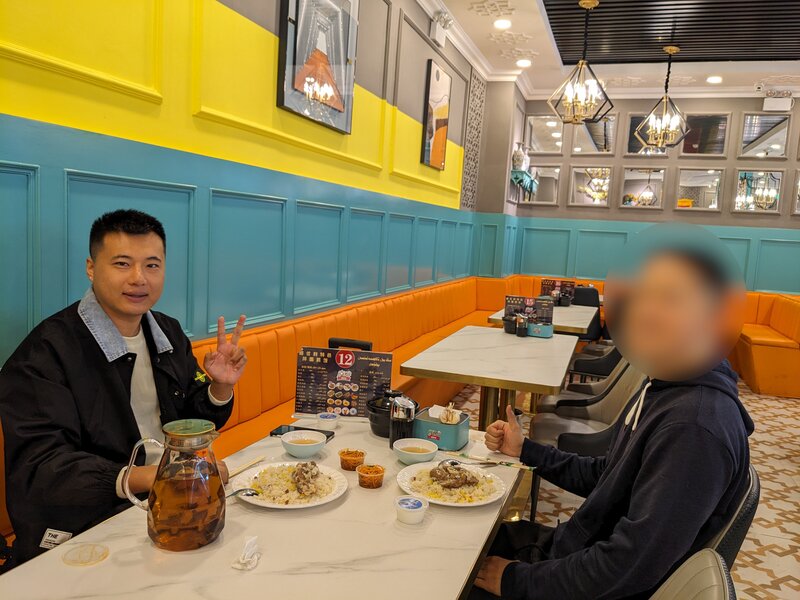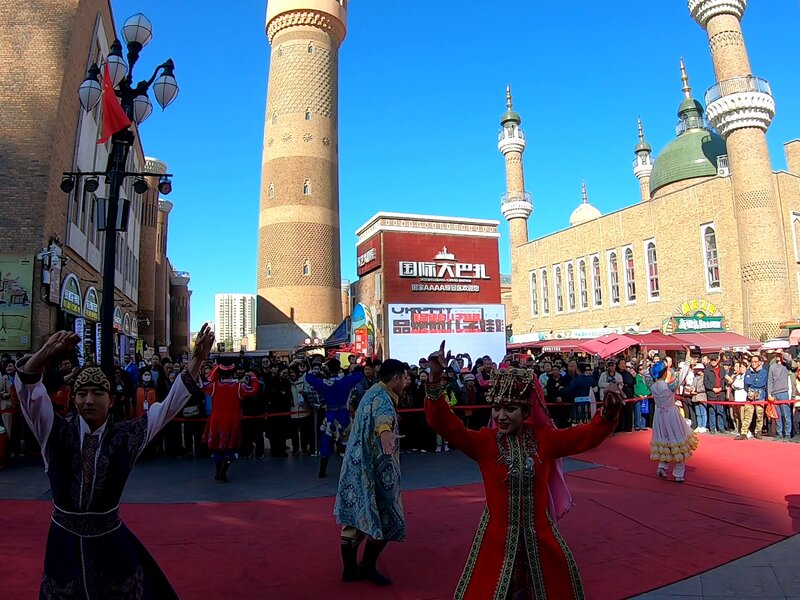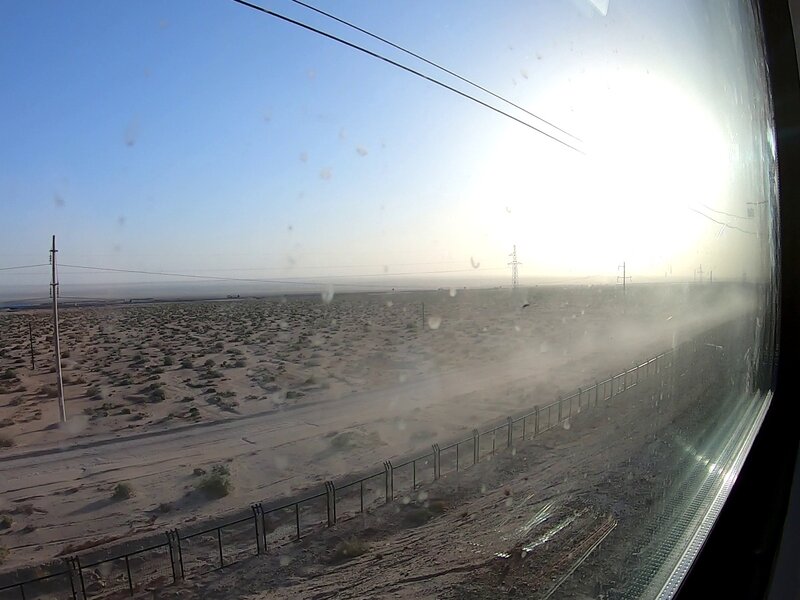I woke up to the sound of conductors going around the cabins announcing that the train was approaching Urumqi. Of course, I didn’t really understand what they actually said, but that is what I made it out to be. It was pitch-black outside but an increasing number of lights were gradually coming into view. We eventually rolled into Urumqi station and I hopped off the train where I had spent the last twenty-six hours. The environment had changed again after the train ride. Although most people around were still Han Chinese, there were more ethnic minorities here, many of them wearing traditional hats. Another thing that stood out was the Arabic script. Virtually all signs had Mandarin and the local language translation written in Arabic characters. When I followed the crowd and got out of the station, it was only 6:30AM and the sky was still dark. I learned later that there is only one time zone in China, and that the sun rises late in Xinjiang during this time of year.

Urumqi station at 6:30AM. The sun rose late in Xinjiang.
I was pretty hungry because all I had since leaving Xi’an was instant noodles and some snacks. So I figured I’d go to the city center and try to have some breakfast. I walked to the nearby bus station, but it was pretty dark and no buses seemed to be coming. There was a guy standing near me, so I asked, “Is the bus fifty-four coming here?” He paused for a bit and slowly replied, “My home isn’t here.” It turned out that he also just arrived in Urumqi. He introduced himself as Sam and we could communicate using basic English. Neither of us had a translation app, so we added each other on messenger, sent messages while standing right in front of each other, and used the in-app translation. Apparently, Sam was pretty hardcore–he had arrived here on a forty-hour train ride all the way from the eastern part of China. Since we were both new to the city, we decided to team up and go to the city center, with the Grand Bazaar as our first stop. “Why did you come to Xinjiang?” I asked out of curiosity. “Because,” Sam said, “autumn is beautiful here.” That was a great answer. I wished that I could also explain my trip with the same simplicity and certainty.
Some more passengers showed up at the stop while we were chatting. After some time, a different bus arrived, and Sam suggested we hop on it anyway because it was going to the city center. Only after boarding did we find out that there was a special app to pay for buses around here, and the usual payment apps didn’t work. So we sat down near the driver while Sam installed the required app on his phone. Then he scanned the code near the front door and paid the fare for both of us. I had no idea what the app was called or whether it even worked with my Australian bank card. “How much was it?” I asked, and Sam told me not to worry about it. The packed bus drove toward the city center as the dawn slowly broke and cast pale light across buildings and streets. The temperature was noticeably lower than it had been in Xi’an, and the cold morning air felt uninviting. I tried to figure out where we were, but the bus didn’t have any English announcements or signs. The announcements were only made in local language followed by Mandarin.
We hopped off near the city center and transferred to another bus to head to the Grand Bazaar. The sun was fully up by that time, and I was able to get a good look at downtown Urumqi as we waited for the next bus. It was a city, the same way that Beijing or Xi’an was a city. It was just another big place where people lived their lives. Based on how the media portrayed Xinjiang, I was expecting to see a more overtly oppressive or dystopian atmosphere. But the city was just a city and the people were just people, going about their days like anywhere else.
By the time we got off the bus for the second time, the streets were full of cars and the city was wide awake. Some restaurants were preparing to open up, cooking outdoors in large pots that sent up clouds of steam rising into the cold morning air. “Want to get some breakfast?” I asked Sam. Sam spoke into an app and showed me a translation, “People take lunch quite late here.” I hoped ’lunch’ was a mistranslation. I was getting too hungry.
In the distance, I could see the tips of tall pillars topped with crescent moons. It was the Grand Bazaar. There was a heavy police presence near the entrance. There were police in other cities like Beijing and Xi’an, but Urumqi seemed to have even more. We went through the checkpoint with airport-style security, guarded by policemen carrying small shields, and entered the bazaar. It was pretty interesting to find buildings with Islamic architecture and Arabic writing in China. But there was nothing much to do there, as we were pretty early and all the shops were still closed. So we figured we’d roam the nearby streets and have some local breakfast. After walking into a few restaurants, we eventually sat down and ordered mutton with rice, and some tea. Sam said it was a well-known dish in Xinjiang. My hands and face were still ice-cold from the streets, and the warmth of the mutton and the hot tea finally loosened me up.

A Xinjiang breakfast. Sam wouldn’t let me pay.
After having the first proper meal since leaving Xi’an, I began thinking about my next steps. My biggest concern at the time was whether the border crossing between China and Kyrgyzstan would be open. I had heard that it was often closed during the holidays or for other arbitrary reasons. But with the language barrier, I didn’t know where to check the status or how to start asking around. If the border was closed, my entire plan would fall apart, and I would need to find an entirely new route to Central Asia. It was unsettling to think that a couple of days’ delay from the border closure might just make or break my goal of reaching Dublin. So I told Sam about my plan for leaving Urumqi that very afternoon to go to Kashgar, and how I wanted to cross into Kyrgyzstan through the Irkeshtam Pass. Understanding my uncertain feelings regarding the border opening, he began making some calls. After about five minutes and many phone calls, he confirmed that the border would be open by the time I planned to reach it. “Leaving very soon,” he added, with a curious look.
We ordered some more shashlik and some desserts made from goat milk. While having the desserts, Sam suggested checking out the Xinjiang Museum. I had been thinking about going to some local mosques and wandering through town, but the museum sounded just as interesting. Since it was already past 10:00AM and my train was leaving at 2:40PM, I wasn’t sure whether there would be enough time. But we decided to give it a try anyway. On the way out, no matter how much I insisted, Sam wouldn’t let me pay for the meal. He said that it wouldn’t be proper for me to pay since I was a guest. His generosity was so natural and unquestioning that it caught me off guard. From that moment, a question started to take root and stayed with me ever since: People are kind. Can I be just as kind to others?
We headed out to a nearby bus station to try to catch a bus to the museum. While we were blending in with the busy rhythm of a typical city morning, something interesting caught my eye–military trucks were parked along the major streets, and fully armed soldiers were vigilantly scanning for any signs of trouble with sharp and unblinking focus. “Wow,” I remarked, “there is military everywhere.” Sam told me that it was pretty normal here to see military and checkpoints. “There was a big riot a few years ago,” he said. I began to realize that the streets might be hiding a certain tension that I wasn’t able to pick up as a short-term visitor.
We waited for a while but the bus was nowhere to be found in the heavy morning traffic. When it was eleven o’clock, I told Sam that I wouldn’t have time for the museum after all. I was running short on time and still wanted a chance to explore the city before leaving. So we decided to check out the Grand Bazaar before I had to go. By the time we went back, the Grand Bazaar was slowly opening up and more people were walking around. Sam bought a bag of Uyghur snacks made from milk and mango and handed it over to me, saying that I would need it on the train. I thought about it and he was right. Although Urumqi and Kashgar were both in Xinjiang, they were still more than fifteen hours apart by train. Even after a few days in China, I still kept forgetting about just how enormous the country really was.

A Uyghur dance performance
Just as we were walking out of the Grand Bazaar, an audience was gathering near the entrance. There were performers dressed in traditional costume and upbeat music was playing in the background. Soon they started dancing, and we stayed awhile and watched the show. Everyone including the dancers and the audience were happy and cheering. So where was that tension I had felt on the streets watched over by the armed military? Was it all imaginary, or did people simply learn to get used to it? I thought about asking Sam, but it didn’t seem fair to unload such a complex question as I was about to take off. The performance was running long, and we eventually left. I had a train to catch, and Sam had to check into his accommodation. We said goodbyes, wished each other the best, and went our separate ways.
I took a subway to head back to the Urumqi railway station. There was something interesting about the subway. It seemed to me that, no matter where you went in China, the subway system had the same look and feel. The subway cars, the maps, the screen doors, the platforms all felt the same in Urumqi as they did in Xi’an or Beijing. It was such a strange thing to find in a country so large. Even the body scanner and X-ray machine in the station entry were set up the same way. The only noticeable difference in Urumqi was that the signs and maps had Arabic script next to Mandarin.
There was no direct subway back to the railway station, and I needed to transfer into a bus. I was slightly worried because I didn’t have the app to pay for the buses. Getting kicked off a bus wouldn’t be ideal as my schedule was already tight. But the concern sort of drifted from my mind as I walked out of the subway station and saw the clear blue sky. The pleasant autumn air filled me only with hopeful anticipation for the train ride ahead. Only when my bus appeared in the distance and started approaching the stop did the anxiety creep back in. I nervously walked onto the bus and offered the driver cash, and the driver refused. I couldn’t actually get off the bus because there was a long line of passengers boarding behind me. Then, without a word, a woman behind me took care of my fare, and the bus soon departed. In my broken Mandarin, I offered to transfer her the fare, but she just said, “Bu yong” (“No need”). During that bus trip to the station, I kept turning that question over in my head again. People are kind. Can I be just as kind to others? Back home, would I have paid a stranger’s bus fare? I wasn’t too sure, and that question stayed with me.
When I arrived at the station, it was already close to 2:00PM and the train was going to start boarding soon. But I was pretty desperate to freshen myself up because I hadn’t taken a shower since leaving Beijing almost three days ago. So I did what I could by changing my clothes and quickly brushing my teeth in a restroom nearby. As I hurried back to the station, I noticed that the station looked quite different from how it had appeared that morning on my arrival. Of course, the station was now standing in the broad daylight. But that wasn’t the only thing that changed. That morning, not knowing what to expect from this unknown city, all I could feel from the station’s brightly lit facade shrouded in darkness was an uncertain and uneasy atmosphere. Having seen the city with my own eyes, I could no longer sense that uneasy feeling when I looked at the station.
I soon boarded the train to Kashgar. I had been in Urumqi for merely eight hours, but it felt like I had stayed so much longer than that. I didn’t get to see other cool things such as the Xinjiang Museum or the outskirts of the city. But the eight hours in the city felt far more meaningful to me than an eight-day stay would have been. The train got moving and Urumqi, finally demystified in my eyes, gradually disappeared behind the train window. For many hours afterwards, the train rolled through a desert-like landscape with little life. The scenery mostly consisted of sandy soil, with some sorry shrubs scattered about. Every so often, a truck would drive along the train on a dirt road that seemed to lead nowhere, kicking up long trails of dust in its wake. The desert continued endlessly, reminding me once again of just how massive this country really was. One time, the train passed a wind farm with countless wind turbines steadily rotating. The unending rows of turbines continued sliding by the train window for more than an hour.

Deep in the far-Western Xinjiang, all I could see were sand and a merciless autumn sun.
As I was sitting beside the window in the narrow corridor, a policeman approached and started addressing me in English. He took my passport and started asking where I was headed. Somehow, I had a feeling I would be interrogated on the train because I hadn’t seen any other foreign tourists in Xinjiang thus far. The policeman also looked very suspiciously at the US visa and began discussing it with the train crew. For some reason, whenever I was boarding trains, the staff had always been particularly interested in the US visa and had snapped photos of it. I explained to the policeman that I was going to Kashgar, and from there, I planned to cross into Kyrgyzstan to eventually reach Europe. After some more serious-sounding discussion with the crew, the policeman eventually returned my passport and vanished. When the policeman went away, I looked at myself and realized that I probably did look kind of suspicious, typing away on my laptop with a bunch of wires hanging out of it for charging my devices.
Inevitably the fierce reign of the autumn sun was coming to an end, and it got colder as the darkness fell on the desert. The sand had found its way into the train, and I could feel its fine grains on my laptop and bedsheets. I had instant noodles while watching the desert fade into twilight. Not repeating the mistakes from my previous train ride from Xi’an, not only had I bought plenty of food before boarding, but I had also made sure to bring a fork. Things you learn as you travel, I guess. The train kept trotting along the dark and lonely desert. Short, stubborn bushes of nameless plants, the only inhabitants of the dry wasteland, were the only things that stared back at me as the train moved on.